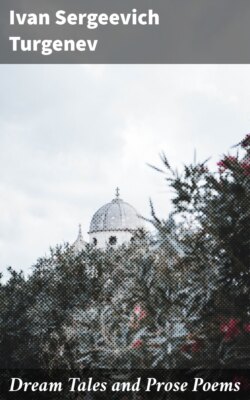Читать книгу Dream Tales and Prose Poems - Ivan Sergeevich Turgenev - Страница 8
На сайте Литреса книга снята с продажи.
V
ОглавлениеTable of Contents
He was agitated by strange sensations, incomprehensible to himself. In reality, Clara’s recitation, too, had not been quite to his taste ... though he could not quite tell why. It disturbed him, this recitation; it struck him as crude and inharmonious.... It was as though it broke something within him, forced itself with a certain violence upon him. And those fixed, insistent, almost importunate looks—what were they for? what did they mean?
Aratov’s modesty did not for one instant admit of the idea that he might have made an impression on this strange girl, that he might have inspired in her a sentiment akin to love, to passion!... And indeed, he himself had formed a totally different conception of the still unknown woman, the girl to whom he was to give himself wholly, who would love him, be his bride, his wife.... He seldom dwelt on this dream—in spirit as in body he was virginal; but the pure image that arose at such times in his fancy was inspired by a very different figure, the figure of his dead mother, whom he scarcely remembered, but whose portrait he treasured as a sacred relic. The portrait was a water-colour, painted rather unskilfully by a lady who had been a neighbour of hers; but the likeness, as every one declared, was a striking one. Just such a tender profile, just such kind, clear eyes and silken hair, just such a smile and pure expression, was the woman, the girl, to have, for whom as yet he scarcely dared to hope....
But this swarthy, dark-skinned creature, with coarse hair, dark eyebrows, and a tiny moustache on her upper lip, she was certainly a wicked, giddy ... ‘gipsy’ (Aratov could not imagine a harsher appellation)—what was she to him?
And yet Aratov could not succeed in getting out of his head this dark-skinned gipsy, whose singing and reading and very appearance were displeasing to him. He was puzzled, he was angry with himself. Not long before he had read Sir Walter Scott’s novel, St. Ronan’s Well (there was a complete edition of Sir Walter Scott’s works in the library of his father, who had regarded the English novelist with esteem as a serious, almost a scientific, writer). The heroine of that novel is called Clara Mowbray. A poet who flourished somewhere about 1840, Krasov, wrote a poem on her, ending with the words:
‘Unhappy Clara! poor frantic Clara!
Unhappy Clara Mowbray!’
Aratov knew this poem also.... And now these words were incessantly haunting his memory.... ‘Unhappy Clara! Poor, frantic Clara!’ ... (This was why he had been so surprised when Kupfer told him the name of Clara Militch.)
Platosha herself noticed, not a change exactly in Yasha’s temper—no change in reality took place in it—but something unsatisfactory in his looks and in his words. She cautiously questioned him about the literary matinée at which he had been present; muttered, sighed, looked at him from in front, from the side, from behind; and suddenly clapping her hands on her thighs, she exclaimed: ‘To be sure, Yasha; I see what it is!’
‘Why? what?’ Aratov queried.
‘You’ve met for certain at that matinée one of those long-tailed creatures’—this was how Platonida Ivanovna always spoke of all fashionably-dressed ladies of the period—‘with a pretty dolly face; and she goes prinking this way ... and pluming that way’—Platonida presented these fancied manoeuvres in mimicry—‘and making saucers like this with her eyes’—and she drew big, round circles in the air with her forefinger—‘You’re not used to that sort of thing. So you fancied ... but that means nothing, Yasha ... no-o-thing at all! Drink a cup of posset at night ... it’ll pass off!... Lord, succour us!’
Platosha ceased speaking, and left the room.... She had hardly ever uttered such a long and animated speech in her life.... While Aratov thought, ‘Auntie’s right, I dare say.... I’m not used to it; that’s all ...’—it actually was the first time his attention had ever happened to be drawn to a person of the female sex ... at least he had never noticed it before—‘I mustn’t give way to it.’
And he set to work on his books, and at night drank some lime-flower tea; and positively slept well that night, and had no dreams. The next morning he took up his photography again as though nothing had happened....
But towards evening his spiritual repose was again disturbed.
